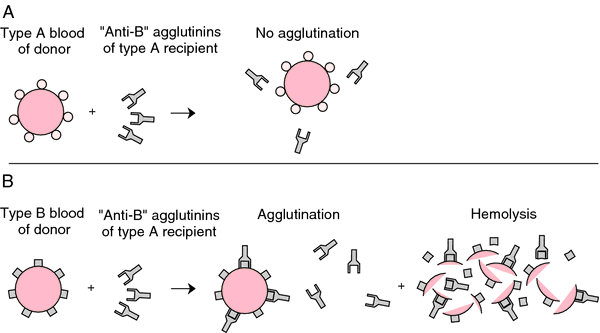agglutination
Also found in: Dictionary, Thesaurus, Encyclopedia, Wikipedia.
agglutination
[ah-gloo″tĭ-na´shun]1. the action of an agglutinant substance.
2. the clumping together in suspension of antigen-bearing cells, microorganisms, or particles in the presence of specific antibodies (agglutinins).

Agglutination reactions. From Applegate, 2000.
3. the process of union of the surfaces of a wound. adj., adj agglutina´tive.
cross agglutination the agglutination of particulate antigen by an antibody raised against a different but related antigen; see also group agglutination.
group agglutination agglutination, usually to a lower titer, of various members of a group of biologically related organisms by an agglutinin specific for one of that group. For instance, the specific agglutinin of typhoid bacilli may agglutinate other members of the colon-typhoid group, such as Escherichia coli and Salmonella enteritidis.
intravascular agglutination clumping of particulate elements within the blood vessels; used conventionally to denote red blood cell agglutination.
platelet agglutination the clumping together of platelets owing to the action of platelet agglutinins; such agglutinins are important in platelet typing.
agglutination test any test based on an agglutination reaction, as serologic tests for specific antibodies.
Miller-Keane Encyclopedia and Dictionary of Medicine, Nursing, and Allied Health, Seventh Edition. © 2003 by Saunders, an imprint of Elsevier, Inc. All rights reserved.
ag·glu·ti·na·tion
(ă-glū-ti-nā'shŭn),1. The process by which suspended bacteria, cells, or other particles are caused to adhere and form into clumps; similar to precipitation, but the particles are larger and are in suspension rather than being in solution. For specific agglutination reactions in the various blood groups, see Blood Groups Appendix.
2. Adhesion of the surfaces of a wound.
3. The process of adhering.
[L. ad, to, + gluten, glue]
Farlex Partner Medical Dictionary © Farlex 2012
agglutination
(ə-glo͞ot′n-ā′shən)n.
1. The act or process of agglutinating; adhesion of distinct parts.
2. A clumped mass of material formed by agglutination. Also called agglutinate.
3. Physiology The clumping together of red blood cells or bacteria, usually in response to a particular antibody.
4. Linguistics The formation of words from morphemes that retain their original forms and meanings with little change during the combination process.
ag·glu′ti·na′tive (-n-ā′tĭv, -ə-tĭv) adj.
The American Heritage® Medical Dictionary Copyright © 2007, 2004 by Houghton Mifflin Company. Published by Houghton Mifflin Company. All rights reserved.
agglutination
Lab medicine The clumping of aggregates of antigens or antigenic material-eg bacteria, viruses, with antibodies in a solution. See Latex agglutination test Reproductive biology The conjoining of 2 organisms of the same species for sexual reproduction, which may be mediated by a carbohydrate on one organism and a protein on the other, thereby forming a glycoprotein.McGraw-Hill Concise Dictionary of Modern Medicine. © 2002 by The McGraw-Hill Companies, Inc.
ag·glu·ti·na·tion
(ă-glū'ti-nā'shŭn)1. The process by which suspended bacteria, cells, or other particles are caused to adhere and form clumps; similar to precipitation, but the particles are larger and are in suspension rather than being in solution.
2. Adhesion of the surfaces of a wound.
3. The process of adhering.
[L. ad, to, + gluten, glue]
Medical Dictionary for the Health Professions and Nursing © Farlex 2012
agglutination
The clumping and sticking together of normally free cells or bacteria or other small particles so as to form visible aggregates. Agglutination is one of the ways in which ANTIBODIES operate. From the Latin ad , to and glutinare , to glue.Collins Dictionary of Medicine © Robert M. Youngson 2004, 2005
agglutination
a clumping together of cells, usually as a result of reaction between specific ANTIGENS and ANTIBODIES in blood and lymph, forming a natural defence against foreign materials, including bacterial cells. Transfusion of blood between persons of different ABO BLOOD GROUPS is also subject to the risk of agglutination (see UNIVERSAL DONOR and UNIVERSAL RECIPIENT). Agglutination is a different process from BLOOD CLOTTING.Collins Dictionary of Biology, 3rd ed. © W. G. Hale, V. A. Saunders, J. P. Margham 2005
ag·glu·ti·na·tion
(ă-glū'ti-nā'shŭn)1. The process by which suspended bacteria, cells, or other particles are caused to adhere and form into clumps.
2. Adhesion of the surfaces of a wound.
3. The process of adhering.
[L. ad, to, + gluten, glue]
Medical Dictionary for the Dental Professions © Farlex 2012